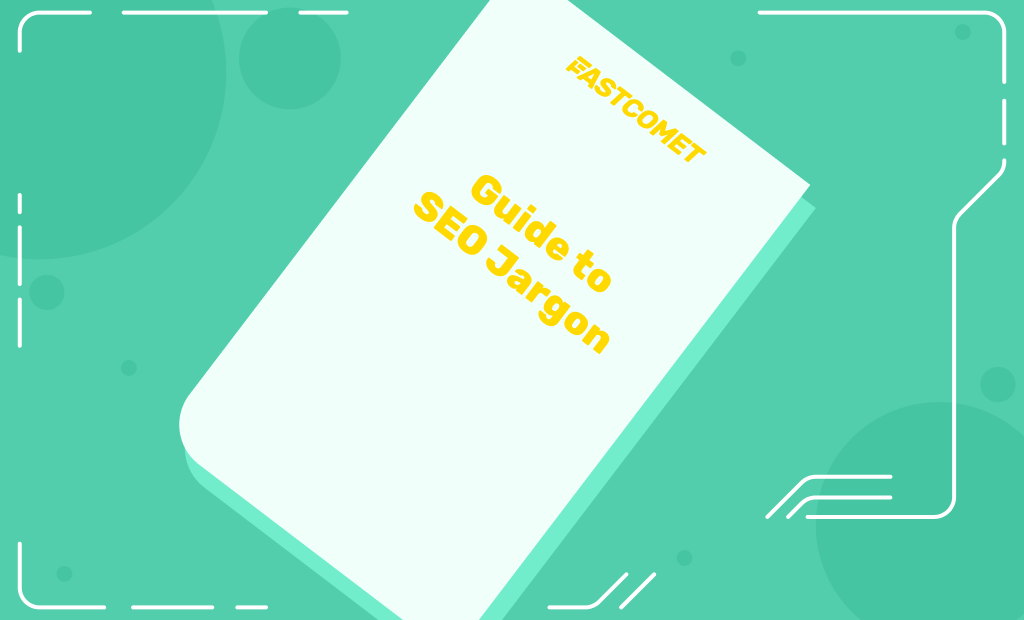
Your Plain-English Guide to SEO Jargon
One of the most significant factors when it comes to a website’s success nowadays is SEO. Those three big letters that everyone has heard, but not everyone fully understands. If you’ve ever dipped your toes into the world of SEO, it probably felt like you stumbled into a secret society with its own mystical acronyms: SERP, DA, CTR, backlinks, and so many more. That’s all SEO jargon, and we are here to help you understand.
Much like any other jargon, the terminology used when talking about SEO is not here to confuse. Instead, it’s just a way for marketers, developers, and content creators to talk about how websites perform in search engines. It’s the same thing with the hosting jargon we posted about earlier this month: just a language that you need to learn.
Follow along as we dive into some of the most essential SEO jargon. From core terms to more specialised technical and content jargon, you’ll know all you need to get started in the truly vast world of SEO.
Core SEO Terms You’ll Hear Everywhere
Let’s start with the basics: SEO jargon you’ll encounter the most. In our experience, these are the most widely used words and phrases, which also makes them some of the most important.
- SERP (Search Engine Result Page) – This is the page you see after you search for something in Google, Bing, etc. It’s the list of pages you see on your screen.
- Keyword/Keyphrase – The word or phrase people type into a search engine. There are two types.
- Short-tail Keywords – These are usually a single word and are very broad in their search parameters. The word “shoes,” for example, will show you a ton of uncurated results.
- Long-tail Keywords – On the other hand, these keywords are much more specific. “Women’s waterproof hiking shoes” will show you precisely what you are looking for.
- Organic Traffic – This measures the number of visitors who find your site through search engines, rather than paid ads.
- Backlink – A vote of confidence, a backlink is a link from another site to yours. It shows that other sites trust yours and can boost your SEO.
- Domain Authority (DA) – While not directly used by Google in its search rankings, DA is a score that predicts how likely a site is to rank well. Developed by Moz, it’s a useful comparative metric.
- CTR (Click-Through Rate) – Finally, this measures the percentage of people who click your link when they see it in search results. Higher CTR typically means your site title and description are appealing.
These are the “gateway” SEO terms. You’ll see them everywhere and will help you to decode most SEO conversations. Not only that, but they will also help you when looking through your site’s analytics for improvements.
Technical SEO Terms
We know that the words “technical knowledge” can be intimidating to folks who aren’t that well-versed in SEO or web hosting. And while we are more than happy to offer our own technical expertise, we also love educating on the topic.
When it comes to technical SEO jargon, it’s all about behind-the-scenes stuff that makes your site readable and understandable to search engines. Remember, a search engine can’t read and comprehend a site the way you and we do. So, they need a bit of help, and these are some of the things that can provide it.
- Crawl/Index – For a search engine to recognize your site, it must first crawl/index it. It sends “bots” (crawlers) to your site and adds (indexes) your pages in its database. From then on, your site can start appearing in SERPs.
- Sitemap – This is a small file that lists all the important pages on your site. It’s a map for search engines to find and index them.
- robots.txt – This handy file contains rules about what search engines can and can’t crawl. You can exclude individual pages or block entire bots from accessing your site.
- Canonical URL – In case you have duplicates of a page, a Canonical URL tells search engines which one is the “main.”
- Alt Text – A short description of an image that helps search engines know what it’s about.
- Core Web Vitals – Google’s set of performance metrics. They measure how fast, stable, and user-friendly your site is.
Knowing these few terms will save you from having to become a developer to understand more technical conversations. You should also gain a clearer understanding of why specific site changes affect rankings.
Content & On-Page SEO Jargon
As this section’s heading suggests, On-page SEO is all about the content on your website. For best SEO results, your content should be appealing not only to humans, but to search engines as well.
We’ve compiled a list of SEO jargon that you can use as building blocks for pages that rank well and keep visitors interested.
- Meta Title & Meta Description – These are the two things you, or anyone else, see in a SERP. Look for anything on Google right now, and you’ll notice how each result has a (meta) title and a (meta) description. The more appealing, the better.
- Heading Tags – Headings give structure to your content. More importantly, search engines use them to understand the structure and hierarchy of information. We recommend having one H1 tag, then as many H2 and H3 tags as you need to structure your page.
- Keyword Density – This one is simple: the percentage of times a given keyword appears in a page. That’s compared to the total word count, but more isn’t always better. “Keyword stuffing” is something you want to avoid.
- Internal Linking – As the name suggests, these are links that connect one page of your site to another. This helps guide visitors and crawlers in understanding your site’s structure.
When it comes to good On-page SEO, it’s not all about stuffing as many keywords in it as possible. That used to be the case a long time ago, but not anymore. Your content should be intuitive and pleasant for visitors and crawlers to browse.
Off-Page SEO & Link-Building Terms
On the other hand, you have Off-page SEO, which focuses on SEO signals that happen outside your website. Backlinks (that we mentioned earlier) and brand mentions can strengthen your site’s credibility.
It’s your site’s reputation in this vast online world, and these terms should help you to navigate it a bit more easily.
- Link Juice – An informal term for the SEO value (authority) passed from one page to another through links. Search engines perceive such links as “recommendations,” so the more “juice” a link receives, the more authoritative it can become.
- DoFollow vs NoFollow Links – These two types of links (hyperlinks) determine whether the linked content gains Link Juice or not. DoFollow will help to improve the linked page’s ranking, while NoFollow does the opposite.
- Guest Posting – This term describes posting content (most commonly articles) on other sites to reach new audiences and earn backlinks.
- Citation – Finally, a citation–or an online mention–of your site can boost local SEO. For instance, if you are running a business and another website mentions your name, address, phone number, etc., it can be a good signal.
While On-page SEO sets the stage, Off-page SEO gives your site the credibility and authority it needs to climb search rankings.
Analytics & Performance Terms
Our final selection of SEO-related jargon is about analytics and performance. These will help you understand and measure your SEO efforts.
What these terms describe is visitor behavior. They translate the way people interact with your website into numbers you can act upon.
- Bounce Rate – This is the percentage of people who leave your site after visiting just one page. There can be many reasons for this, but slow site speeds, unresponsiveness, or unappealing content are some of the bigger ones.
- Session Duration – How long a visitor spends on your site in one visit. Usually, the longer the better.
- Impressions – The number of times your page shows up in search results.
- Conversion Rate – Finally, this is the percentage of people who take a desired action (typically what’s on the page). For example, buying an item or signing up for a newsletter.
Understanding these metrics turns guesswork into hard strategy. They serve as your compass for determining what’s working and what needs adjustment.
Common Misconceptions About SEO Terms
Now that you have a solid base of SEO terms to stand on, let’s demystify a few common misconceptions. These are often caused by a misunderstanding of what an SEO term means, leading to wasted effort or misplaced priorities.
- Ranking #1 Isn’t Everything: Being at the top of a SERP is not as important as it used to be. Now things like CTR, conversions, and search intent matter a lot more than just position. Being on the first page of a SERP is fantastic, but the content you offer is what drives visitors to come and stay.
- Domain Authority is NOT a Google Metric: If you are trying to optimize for Google, then DA is not something you must be overly concerned with. Google does not consider it part of its metrics. However, it is a good tool to have for comparison.
- Keyword Density Has No Magic Number: We mentioned keyword stuffing earlier, and it’s worth talking about this again. There isn’t an optimal number of keywords you should have, depending on the number of words on your page. Nowadays, search engines are far more focused on relevance and quality than raw keyword repetition.
These three misconceptions are among the most significant we’ve noticed. Knowing they exist and the truth behind them will help you focus on what truly impacts your site’s visibility.
Conclusion
SEO jargon doesn’t have to be a barrier. Instead, it’s just a set of tools for communicating about how your site performs. Once you learn the lingo, you’ll find it easier to make sense of analytics reports, follow SEO advice, and talk strategy with confidence.
Remember this guide, and next time someone drops a term like “canonical URL” or “bounce rate,” you’ll know exactly what they mean, without Google’s help.

The latest tips and news from the industry straight to your inbox!
Join 30,000+ subscribers for exclusive access to our monthly newsletter with insider cloud, hosting and WordPress tips!



No Comments